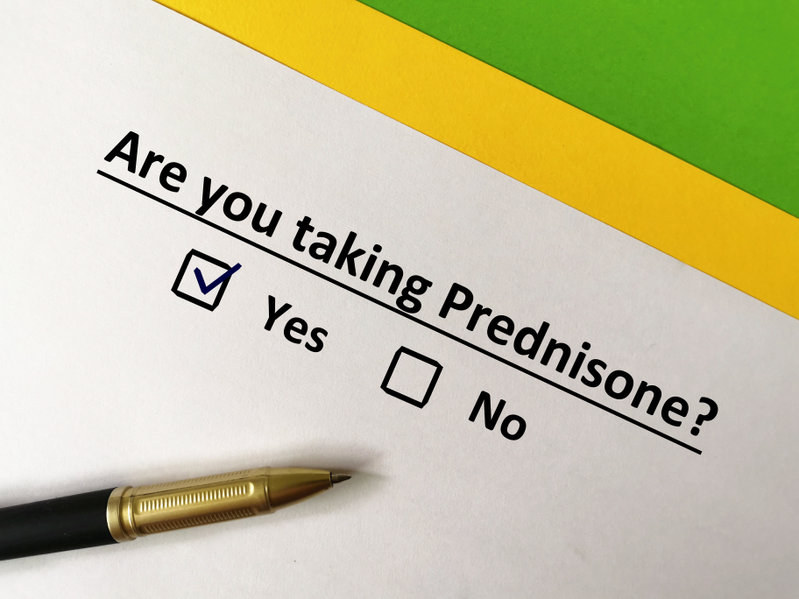Prednisone is a corticosteroid (or “steroid” for short) and is used as an anti-inflammatory or immunosuppressant agent to treat many different diseases (see below). Your body naturally produces a steroid called cortisol; cortisol keeps your immune system from making substances that cause inflammation. Prednisone acts like cortisol and works to slow or stop your immune response and prevent or reduce inflammation. Prednisone may be prescribed by your doctor for a short burst or it may be taken for longer periods of time (chronically).
FDA approved indications:
- Allergic reactions, including angioedema and hives
- Hematologic (or blood) disorders (like immune thrombocytopenia)
- Dermatologic disorders
- GI disorders
- Rheumatic disorders (like gout flares, rheumatoid arthritis, and lupus)
- Nervous system disorders (like multiple sclerosis)
- Respiratory disorders (like asthma)
- Endocrine disorders
- Solid organ rejection
- and many others!
Off-label uses:
- New onset Bell palsy
- COPD exacerbations
- COVID-19
- Muscular dystrophy
- Autoimmune hepatitis
- Myasthenia gravis crisis
- Pericarditis
- Pneumocystis pneumonia
- Prostate cancer
- Tuberculosis
- Hives
- and many others!
What are some side effects of prednisone?
Common side effects of short-term use include:
- fluid retention or swelling in your legs or feet
- sweating
- hyperactivity or mood swings
- upset stomach or nausea
- increased appetite
- increased blood sugar
- increased blood pressure
Side effects seen with chronic use may include:
- increased risk of infection
- weight gain
- thinning bones (osteoporosis) and increased risk of bone fractures
- increased cholesterol
- thin skin, bruising, and slow wound healing
- elevated pressure in your eyes (glaucoma)
What else should I know?
It is always important to tell your medical doctor and pharmacist about all prescriptions, OTCs, vitamins, and herbal supplements you take before starting a new medication. This information can help prevent possible drug interactions and serious side effects.
You should never stop taking prednisone suddenly if you have been taking it for more than 3 weeks at a time. Your dose should be reduced slowly over time to allow your body’s immune system to return to normal. If you discontinue this medicine suddenly, you may experience side effects such as fatigue, body aches, and lightheadedness.
Unless otherwise directed by your doctor, it is best to take prednisone in the morning with food or milk. It affects your immune system less in the morning and bothersome side effects like hyperactivity are likely to wear off by bedtime.
Corticosteroids like prednisone can cause a wide range of side effects, but are generally safe for short term, occasional use. Your medical provider will decide if your condition requires longer treatment with steroids and how to deal with unwanted side effects.
Read our blog about Anti-Inflammatory Foods
References:
- Puckett Y, Gabbar A, Bokhari AA. Prednisone. [Updated 2021 Apr 19]. In: StatPearls [Internet]. Treasure Island (FL): StatPearls Publishing; 2021 Jan-. Available from: https://www.ncbi.nlm.nih.gov/books/NBK534809/
- Marion, DW. Prednisone. In: UpToDate, Post, TW (Ed), UpToDate, Waltham, MA, 2021.











